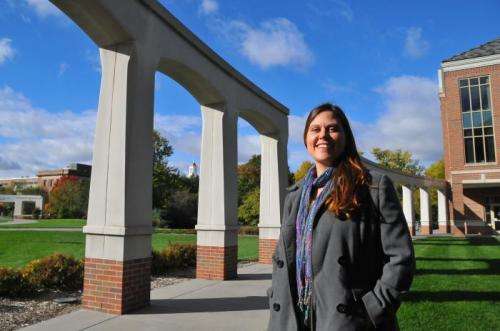When do would-be mothers opt for adoption?

A new study from the University of Nebraska-Lincoln explores why Americans—even those with fertility problems—don't opt for adoption more often as their route to parenthood.
Though adoption is viewed positively in the United States, the rate of adoptions per 100,000 population declined by 5 percent from 2000 to 2008, according to the data from the U.S. Department of Health and Human Services. Nearly 136,000 children were adopted in 2008, slightly fewer than the previous year.
In a recent study analyzing data from 876 childless women, two UNL researchers examined what leads would-be mothers to consider adoption.
"We can see that, statistically, people are supportive of adoption. They think it's a good thing—but it's not for them. They view it as a last resort," said Nicholas Park, an assistant professor of sociology at the Wentworth Institute of Technology in Boston. Park launched his study of attitudes toward adoption while a graduate student at UNL.
Those actively considering adoption were in the minority, comprising 12 percent of the group studied by Park and Patricia Wonch Hill, a research assistant professor with UNL's Department of Sociology.
In comparison, 36 percent said they had never considered adoption and 52 percent said they had considered it in the past, though they were not currently pursuing it.
Park and Hill found that women who have sought medical treatment for infertility and those who place high importance on motherhood are those who are most likely to be actively considering adoption.
They used data collected in the National Survey of Fertility Barriers, a nationwide survey of 4,792 women of childbearing age, collected between 2004 and 2007 by the UNL Bureau of Sociological Research and the Penn State University Survey Research Center.
To hone in on attitudes about giving birth vs. adoption, they analyzed responses only from childless women who wanted to become mothers. They excluded responses from women who were voluntarily child-free and from women who already had children.
"This allows us to better understand whether women ... are interested in biological motherhood or social motherhood, especially for their first child, while leaving out the very different reasons that women choose not to be mothers at all," the authors wrote.
The analysis found that those currently considering adoption were almost four times more likely to have seen a doctor for fertility problems than those who had never considered adoption. Those who were having trouble getting pregnant but hadn't sought medical treatment were less likely to consider adoption.
Those contemplating adoption also had a higher ideal number of children, felt more pressure from their partners to become parents and were more religious than those who never considered adoption and those who had considered it in the past.
African-American women in the sample were more likely to be considering adoption, possibly because a higher proportion reported that they had provided informal foster care for children of friends or relatives. Older women and those with college degrees, however, were less likely to be weighing adoption.
There are many reasons to encourage adoption, the researchers wrote. An estimated 12 percent of U.S. women ages 15 to 44 experience some form of infertility, according to a 2005 study. Though medical treatments and reproductive technology has advanced in recent years, success rates remain relatively low and costs remain high. For women who place high value on motherhood, adoption may be their only avenue to become mothers.
There also is high demand for good parents in the United States, with many children aging out of foster care without gaining a permanent placement.
"For the most part, our culture is very supportive of adoption," Hill said. "It is a positive and giving and loving thing to do—but it's also very tough."
Previous studies have shown hesitation to adopt, the researchers said. Some women view the physical process of pregnancy and childbirth as a powerful part of the transition to parenthood. Recent advances in reproductive technology have increased the amount of time and money couples spend on a quest for a biological child.
Some parents are hesitant to adopt children from the foster care system because they fear they will have more behavioral, emotional or academic problems. Some worry that the biological parents will change their mind and take back the child. Others are discouraged by a long waiting list to receive a child.
"(Adoption) is still being viewed as a last resort, or a second best, if you can't get pregnant or you can't have your 'own' child," said Park, who continues to study adoption, fertility and family formation.
Park and Hill said more research is needed. For example, their data offered no clues why women who previously considered adoption did not pursue it. They also would like more information on why African-American women are more likely to consider adoption. They call for a long-term study to determine how adoption attitudes during a woman's life.
"If childless women are unable to have biological children and if adoption is too difficult to pursue, do they shift their views on motherhood in order to cope?" they asked in the study.
The Journal of Family Issues published the study in July. The research was partly supported by a grant from the National Institute of Child Health and Human Development.















